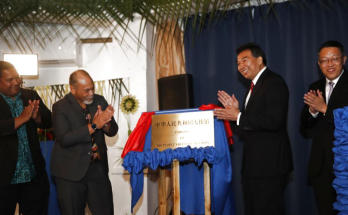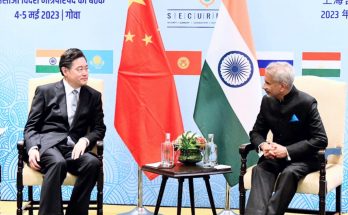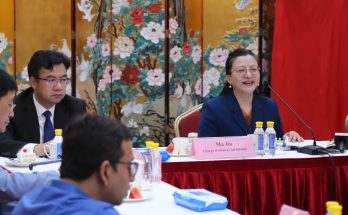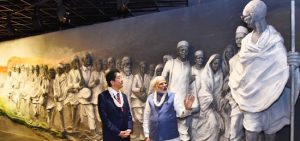 There is nothing like the India-Japan connect that gives an ascendant and assertive China jitters. Given the bonhomie and bonding that was on display between India’s Prime Minister Narendra Modi and Japanese PM Shinzo Abe in Ahmedabad and transformative outcomes that emanated from the summit meeting on September 14, the Chinese media’s backlash hardly comes as a surprise.
There is nothing like the India-Japan connect that gives an ascendant and assertive China jitters. Given the bonhomie and bonding that was on display between India’s Prime Minister Narendra Modi and Japanese PM Shinzo Abe in Ahmedabad and transformative outcomes that emanated from the summit meeting on September 14, the Chinese media’s backlash hardly comes as a surprise.
Dismissing the “growing intimacy” between India and Japan, the Global Times, the hawkish Chinese tabloid which led the propaganda blitz during the Doklam standoff, has warned India not to get into containment games with Japan.
“After the Doklam standoff, more voices in the Indian media instigate the country to step up cooperation with the US and Japan against China and exaggerate the geopolitical significance of closer India-Japan ties. Yet this to a large degree has exposed the vulnerable feeling of the Indian strategic circle in front of China”, the Global Times said in an op-ed article. It attacked Japan by saying “… Japan has been more narrow-minded in looking for allies globally to encircle China.”
In the wake of Doklam standoff, the Chinese daily claimed “the vulnerable feeling of the Indian strategic circle” has been “exposed”. “They want to encourage themselves by calling for India’s alliance with the US and Japan to showcase India’s strategic potential to China,” it said. “China wants to solve problems when it has disagreements with India on specific issues. China won’t actively seek strategic confrontation with India or Japan.”
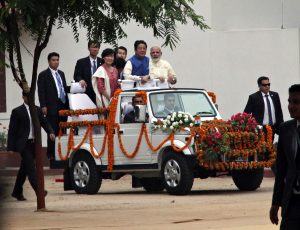 Asserting China’s continued predominance in Asia, the op-ed claimed “A strong China has the confidence that no Asian country can substantially challenge China’s national security, nor can they by grouping together. China has been in the core of economic cooperation in Asia. Geopolitics is unlikely to go against the geo-economic situation.”
Asserting China’s continued predominance in Asia, the op-ed claimed “A strong China has the confidence that no Asian country can substantially challenge China’s national security, nor can they by grouping together. China has been in the core of economic cooperation in Asia. Geopolitics is unlikely to go against the geo-economic situation.”
Japan’s vocal support for India during the Doklam standoff had riled Beijing. The article specified that it was misleading to believe that geopolitics directs international relations. It affirmed the strength of the Chinese mind in not succumbing to “emotional moves” by India and Japan.
The editorial noted that “fundamental issue” in Asia is development. “Whoever develops fast will come out on top as the final winner. Since geopolitical issues can easily disturb people’s attention, China must be fully focused to make sound development a priority of its national strategy,” it said. “We can never follow India and Japan that have somewhat lost themselves,” it said.
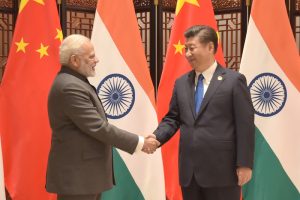
The Chinese reaction is significant given that the joint statement also mentioned the need for countries to rein in terror groups a clear asking Pakistan to book the perpetrators of several terrorist attacks planned from its soil and on North Korea it said that countries that have supported North Korea should also be held accountable.
Author Profile
- India Writes Network (www.indiawrites.org) is an emerging think tank and a media-publishing company focused on international affairs & the India Story. Centre for Global India Insights is the research arm of India Writes Network. To subscribe to India and the World, write to editor@indiawrites.org. A venture of TGII Media Private Limited, a leading media, publishing and consultancy company, IWN has carved a niche for balanced and exhaustive reporting and analysis of international affairs. Eminent personalities, politicians, diplomats, authors, strategy gurus and news-makers have contributed to India Writes Network, as also “India and the World,” a magazine focused on global affairs.
Latest entries
 DiplomacyApril 23, 2024Resetting West Asia, re-booting the world, but not fast enough: T.S. Tirumurti
DiplomacyApril 23, 2024Resetting West Asia, re-booting the world, but not fast enough: T.S. Tirumurti India and the WorldApril 22, 2024India’s G20 Legacy: Mainstreaming Africa, Global South in global agenda
India and the WorldApril 22, 2024India’s G20 Legacy: Mainstreaming Africa, Global South in global agenda DiplomacyApril 10, 2024Diplomat-author Lakshmi Puri pitches for women power at LSR
DiplomacyApril 10, 2024Diplomat-author Lakshmi Puri pitches for women power at LSR India and the WorldApril 6, 2024UN envoy pitches to take India’s solutions to the world stage
India and the WorldApril 6, 2024UN envoy pitches to take India’s solutions to the world stage





